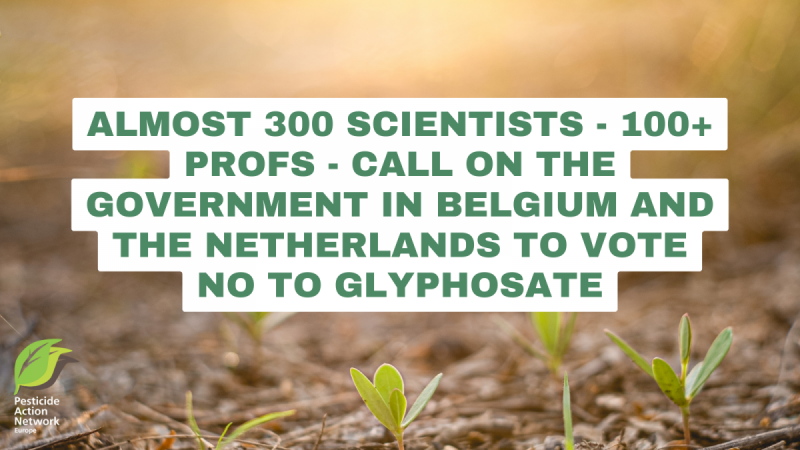The pressure to vote NO to glyphosate on EU governments is increasing. After clear calls by civil society, 2,5 million signatures and a very clear IPSOS opinion poll scientists put their weight behind the call.
In a letter 291 scientists - including 104 professors - from Belgium and the Netherlands ask their ministers to take independent science seriously. This is very important because the official evaluation by EU and national agencies work with a protocol that strongly favours studies commissioned by the chemical industry over independent science. And that science is very clear: glyphosate harms health and the environment in many ways. From harm to ecosystems, water and soil life to the human microbiome. The herbicide and its formulations are related to various types of cancer, brain diseases like Parkinsons' and damage to our immune system. Glyphosate and its breakdown products are omnipresent and found in water, soil and most people's urine.
The scientists criticised the pesticide authorisation: "The current assessment framework has serious shortcomings both for determining the effects on public health and biodiversity. As a result, we believe that it is not possible, with the current EFSA review frameworks, to determine whether glyphosate is safe. We call on the cabinet, specifically the outgoing ministers Adema and Kuipers and ministers Clarinval, Vandenbroucke and Khattabi to heed the voice of concerned citizens and allow the insights from independent science to weigh heavily in your decision and in the future policy."
The way pesticides are assessed in the EU was already heavily criticised by the all-party PEST committee in the EU parliament in 2019. The major influence of pesticide producers can be seen in many different aspects. One is the protocol that ensures independent science is largely left out of the assessment. We named this the Pestgate scandal and described it in the article 'Pestgate: why the EU pesticide control does not work the way it should'.
The scientist's call follows a clear representative opinion poll by IPSOS on public opinion in six EU Member States. A clear majority of citizens (62%) are against the renewal of glyphosate, while only 14% are in favour.
In the poll, 82% of the consulted citizens expressed their concern about the environmental impact of pesticide use. See the results here.
In a different letter 106 civil society organisations from all over Europe ask EU President Von der Leyen to ensure that the EU vote NO to glyphosate.
The letter by Flemish and Dutch scientists is here in Dutch and here in an English translation.
